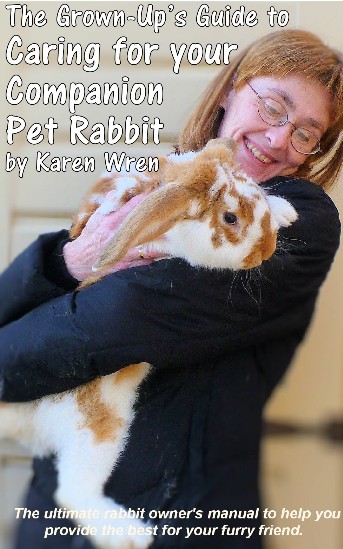Contrary to popular belief, Rabbits are seldom suitable pets for children, particularly young children under 8-10 years old. 50% of children lose interest in pet rabbits within a month and 80% within 3 months.
Sadly, rabbits remain one of the most abused and neglected pets and some rabbits bought as pets for children can end up unwanted, neglected or abandoned while others remain forced to live a lonely existence in an undersized hutch at the foot of the garden, out of sight and out of mind.
This is not the sort of life we want for any of our lovingly-reared bunnies and we urge you to consider whether a bunny will really be a the most suitable pet for your child and family household.
Our aim is not to 'sell' rabbits indiscriminately but to secure the best homes possible for our cherished babies whom we've brought into the world and loving raised for the first few months of their lives.
If you are considering adopting a bunny for a child, please consider the following:
Rabbits are generally not very suitable pets for young children: Children can naturally be lively and noisy which can be very stressful for a highly sensitive pet such as a bunny. Also, children see their 'cuddly' image and often want to treat them as a cuddly toy which, of course, they are not. As a consequence, far too many rabbits are purchased from pet shops on whim with little thought being given to the reality of providing their life-time of care: ie twice-daily feeding, daily cleaning (yes, even in cold and wet weather!), providing daily exercise, socialisation with a compatible, neutered partner and the expense of vet bills for their 6-monthly myxomatosis vaccinations, annual VHD vaccination and neutering at puberty. Also, rabbits are ground-loving animals who often prefer to be fussed at ground level rather than carried around and children might not always understand this. We do not, therefore, recommend bunnies as pets for children under 8-10 years.
All breeds of rabbit require a high degree of commitment and care plus at least 2 hours of handling and social interaction every day. A pair of guinea pigs, rat, gerbil or hamster might be more suitable pets for young children under 10 years of age.
Rabbits, like any pets, need a routine and are sensitive to changes in their feeding, cleaning and exercise routines. This will always need to be over-seen by a responsible adult.
Children can lose interest in any pet once the initial enthusiasm wears off so, and it is estimated that this can happen within just a few months of adoption. An adult must be aware of this and prepared to consider the rabbits to be their own pets and take full responsibility for their bunnies' care throughout their life which could be 7-10 years. Similarly, if an older child is going to university at the age of 18+ then provisions must be made to ensure there will be a carer for the bunnies.
No animal should ever be the sole responsibility of a child. Symptoms of illness, fewer droppings or a change in behaviour which could be indicative of illness might be overlooked by a child.
By far the best arrangement is that adults should adopt rabbits as their own pets and their own responsibility - but then encourage active involvement from your child/children. Allow your children to help with the cleaning and feeding and encourage their continued interest but, if they become bored, then allow their interests to change and naturally move on rather than try to force an interest which isn't there.
'Throw-Away' Pets: Always remember that a rabbit is not a temporary or 'throw-away' pet, or a 'starter pet' for children. Rabbits are living, breathing animals deserving the utmost respect and require the same level of care, commitment and dedication as any other pet animal, large or small.
Teaching 'Responsibility': If the rabbit is adopted to teach a child to become 'responsible' then there is a high risk that, should the child lose interest and be reprimanded for this, then they make start to resent the bunny - and it will be the rabbit who suffers more than the child or parent. Also, if a situation of resentment continues and the rabbit is eventually 'given away', this can send out irresponsible messages to children - that pets are 'disposable' animals or that giving up the rabbit could be used as a 'punishment'.
Rabbits have much in their favour - they are clean, quiet, easy to litter-train, affectionate, interactive and can live indoors or out, in a large house or a small flat. They enjoy company - either rabbit company or human company (but, preferably - both!). They can be playful, go for walks on a lead, learn to respond to their name and simple commands - and they can bond very closely with their owner. Also, they generally live happily alongside other pets if they are introduced carefully and supervised.
If your child is calm, quiet, gentle and interested then rabbits could be the perfect pets for him/her. We've met some extremely caring and sensitive children who show the utmost respect for small animals and it's a delight to meet them and share their enthusiasm. However if your child is noisy, aggressive or boisterous, then we'd recommend a stuffed toy instead!
These observations are not intended to dissuade you from adopting bunnies but have been included in the interests of our bunnies and general bunny-welfare - which is always our utmost priority.
A child's pet? - Ross Rabbits - Probably the friendliest French Lops you'll ever meet
Ross Rabbits
Probably the friendliest French Lops you'll ever meet
Click on 'Hamburger' icon to navigate menu
Ross Rabbits
- probably the most affectionate French Lops you will ever meet

Lorem ipsum dolor sit amet, consectetur adipiscing elit.
